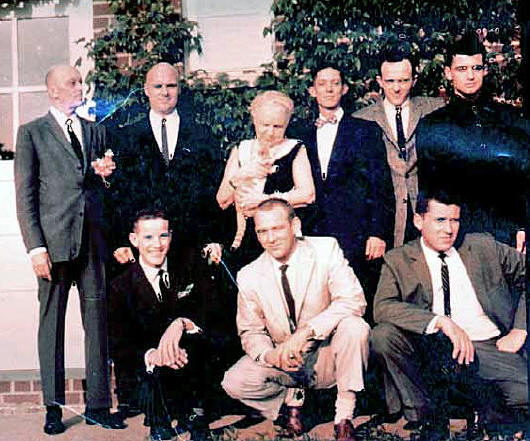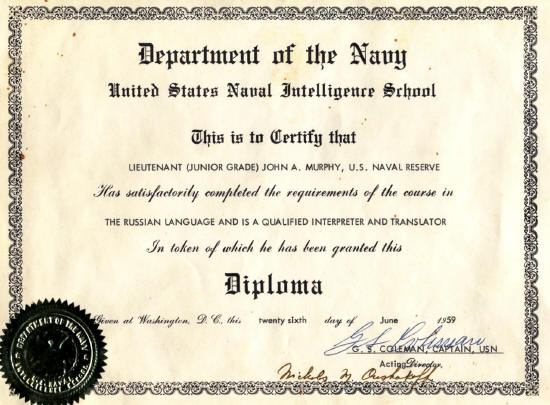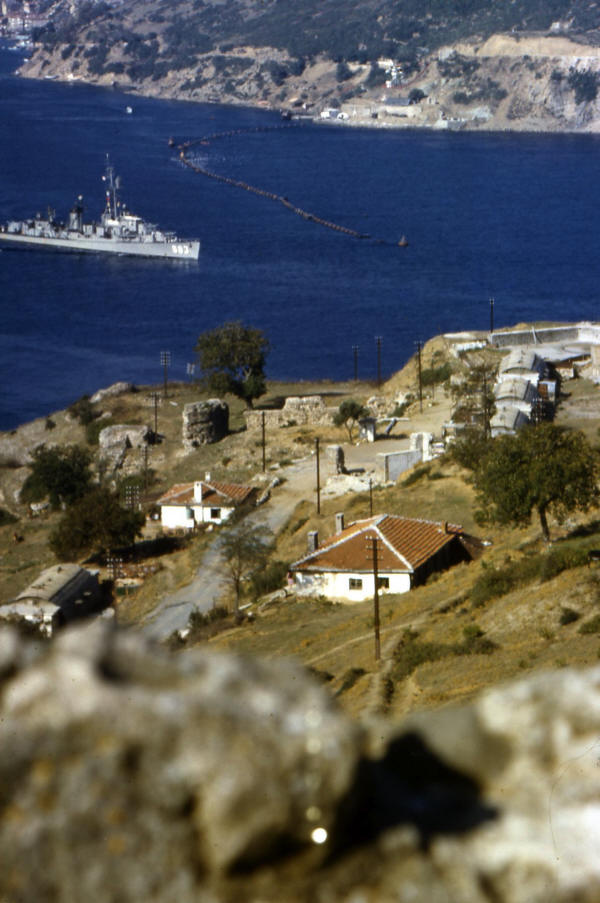Russian Language School overview
The Russian Language Intensive Russian was conducted in a run down, one story WWII temporary building at the old, Naval Intelligence School in Anacostia, Maryland. It looked kind of like the German Prison of War barracks in the WWII movies. The School had about eight classrooms on either side of a corridor running down the middle. On the right side of
the building were classrooms for Chinese, Arabic, German and Spanish classes. The building was in such sad shape that there was hardly any heat in the winter and in the spring of 1959 termites burst through the walls of the main entrance and spilled out into the hallways. We hardly noticed these minor distractions. We were too busy studying.
When I entered in September 1958, the Russian program had about twenty students equally divided between Months 1-3; 4-6 and 7-9. Each class would lose about 1/3rd of its students before graduation through poor grades or mental breakdowns. There were never more that five students in a classroom with a Russian professor at the same time. The professor
sat at a large desk that sat atop a raised platform so that he (or she) had a commanding, god-like position… glowering down at us poor, hapless students. Each week you would have all of your classes in a given professor’s classroom. The next week you would move to the classroom next door and work your way up the corridor. After eight weeks you moved back to Professor number
one. The brilliance of this simple method was that you were exposed to different sounds of Russian from the very beginning.
I gradually came to realize that most of our professors were all from the same White Russian Regiment in old Czarist Russia. From Colonel Ushakov, the Commanding Officer down to Sergeant Rabotnikoff (who I really liked). One was a former German soldier who had learned Russian as a Prisoner of War in WWII. Talk about an "intense" learning experience. I
loved his classes because he was informal and I loved it when he put orange peels on the radiators that clanged away in his office… sending the aroma of fresh orange into the classroom.
There were two women professors who were very formal and what I would describe as "prissy". I remember one day when Rabotnikoff tried to teach us some "dirty" words. He wrote them on the blackboard. Professor Olga passed by the room and saw the words and went nuts. She went straight to Colonel Ushakov’s office and put Rabotnikoff on report. (I would
not learn any other Russian dirty words until two years later when NSA published a special glossary. I learned from this, that the Russians seemed to enjoy using very graphic and pornographic language in their daily speech.)
Professor Galitsin was one of my favorites. He was a former, Czarist, cavalry officer and was quick to remind you that he was a nobleman. He looked down on the likes of Sergeant Rabotnikoff, even when Rabotnikoff became the head of the Russian Program.
Of course the favorite of all Russian teachers was not a professor - it was an older woman who was the school’s secretary. Mar’ya Krishevitskaya. We called her "babushka" (grandmother). She looked old, but she was a dynamo. Swam 20 laps in the base swimming pool every day.
Babushka was the daughter of a Czarist Navy Admiral Krshevitskiy who was killed in the historic Battle of the Tsushima Strait in the Russo-Japanese war in 1905. During the October Revolution in 1917 she was the secretary to Alexander Kerensky, provisional leader of Russia who was overthrown by Lenin. Following the October Revolution, Mar’ya fled Russia
and went to Paris where she became model. Later she emigrated to the U.S. and with the Cold War somehow became the secretary at the Russian Language School.
Mar’ya had a rating system for all former students. They were her vnuki (grandsons). Each was assigned a number. The lower your number the higher your prestige rating at the Language School At her death in the 1960s I was Vnuk #5. Her vnuki stayed in touch with her. Two of her vnuks were at her side when she passed in the early 1970s.
Months 1-3: Words, words, words...
I had no idea what to expect when my 9-month program began in October 1958. I was still trying to figure it out at graduation. On the first day of class professor Rabotnikoff explained that they did not expect much of us in the first few weeks. We had three days to master the Russian Cyrillic alphabet. By the end of week one we were expected to be
totally comfortable with this set of unique symbols. It was Greek to us. We were surprised to discover that they were right…we really only needed about three days to be totally comfortable with the Russian Alphabet of 28 characters.

After the first week we began to be taught 50-100 Russian words each day. We would receive our new word list at the end of classes. They did not care how you learned your word lists, but it was expected that you knew all of your new words by the next morning. By the end of the fourth week I was going crazy trying to master my word lists. My wife said I
would be shouting Russian words in my dreams at night. I did not remember any of that, but knew my brain was never rested in the morning.
After the first month, we were introduced to a school ritual- the weekly "oosniy ekzamen" or oral exam conducted by the gaunt, hostile looking figure of our own "Ivan the Terrible" - Professor Ushakoff. He would enter the classroom unannounced and begin grilling each of the students present on the previous week’s lessons and words. He never cracked a
smile or showed any sense of kindness. He was out to intimidate and scare you. He did a good job of it. It was an event I dreaded for 30 straight weeks.
As junior students we were in awe of the students in the 2nd group (Months 4-6) or 3rd group (Months 7-9). During class breaks these groups would stand out in the main hallway and carry on lively discussions in Russian! We were in awe! We could barely remember one word after another and there they were laughing and chatting informally about anything
and everything. We were impressed.
Each class would consist of reading 1 page of about 300 words in length. Then a review of the new vocabulary and writing drills at the black board to see if you could read and write Russian in both a printed and cursive style. The subject material in the early stages was pretty basic. "Hello, how are you." Where is a bathroom? What is this? This is a
table. This is a pencil. This is a chair. Where do you live? etc. We were so proud as we mastered these simple phrases. We were speaking Russian!
In the afternoon we were introduced to our new word list. You would leave the school in late afternoon and spend the entire evening studying and mastering your new and old words. There was one Navy Lieutenant in our class by the name of Frank Dye who drove us regular students crazy. He had a photographic memory. He would receive his new list of words,
scan it slowly with his finger and voila! He knew them all. In about ten or fifteen minutes. The rest of us might be up to midnight or later trying to learn our new words. At the pace we were working I estimate we were learning 1,000 to 2,000 words a month. The pace picked up as the course proceeded. By the 9th month we were told we knew about 70,000 Russian words.
Towards the end of the second month Professor Rabotnikoff asked if there was any interest in learning some Russian songs. About six of us jumped at the chance. We started meeting every Friday afternoon for practice. Rabotnikoff provided sheet music for several top Russian songs including Kalinka, Don Peterskoy, Stenka Razin and Steppe da Steppe… just
to name a few. We were able to learn how a real Russian chorus would sing these songs since the Soviet Army had just made a recording of many of them in London before the Queen. In 1958 Rabotnikoff arranged with the Navy Band to have an accordionist accompany us as we performed at several D.C. Embassies during the 1958 holiday season. I found it a bit strange singing Russian
songs at the German Embassy at Christmas time.
We liked Don Peterskoy because it was about a guy getting drunk on the streets of St. Petersburg. We didn’t have the luxury of drinking while we were in the 9 month course, but it was fun sounding like we were drunk. Steppe da Steppe was also a favorite. It was a song about a lonely coachmen dying on the frozen steppes of Siberia in a blizzard. It was
a waltz tune and I have used it many times in meetings with Russians here and in Russia… to loosen everyone up and get them all on the same sheet of music … so to speak. Stenka Razin gave us a revolutionary experience. This song was a rallying song for czarist era. I later thought that his entire experience was a wonderful way to introduce us to another part of the real,
Russian culture. The "Russkaya dusha" (Russian soul}. When meeting with Russian scientists and former Soviet military in Russi I would use my knowledge of these songs many times.
Months 4- 6 – Grammar Grinding!
In the 2nd phase of the course... We shifted from learning words to learning the grammar of modern Russian. A mind-boggling task. I felt in the first three months we were making wonderful progress, but now we were going backwards. I had studied Latin in college and could see many similarities between Latin and Russian. Russian is what linguists would
describe as a "totally inflected language". It was like you were learning a giant matrix of words and "endings" where everything had to agree in Gender (masculine, feminine or neuter), Number (singular or plural) and case (Nominative, Genetive, Dative, Accusative, Instrumental and Prepositional/Locative).
The good news was that Russian syntax (sentence structure) is based on English. So you could think in English and put Russian words in the proper gender, number and case. By the end of the sixth month a student’s worst nightmare was to find he had formed a perfect sentence as to number and case, but his subject was feminine and not masculine. You think
it is confusing reading it here? Try it where the symbols are Cyrillic letters and you are being graded on your speed of translation. Also, you knew by the end of the sixth month that you were about to spend the next three months locked in a room with Ivan the Terrible in multi hour simultaneous, interpretive sessions.
One of our class members had a "breakdown" at this point and was transferred to the Bethesda Naval Hospital for treatment. Right after he had received his orders to his post-course assignment to the U.S. Embassy in Moscow. (The dream assignment for all students in the school.) At any rate the rest of us were about to begin the final three months of the
9-month course. In this lay one of the best-kept secrets of the Intensive Russian program.
Months 7-9 – Becoming a real Russian Interpreter
We had come so far since Week 1 of the Intensive Russian Course. Professor Ushakoff entered our classroom on the first afternoon of our 7th month and I remember my heart sinking as the door clicked shut. "Here it is. We are trapped! With Ivan the Terrible!’ Then this gaunt, hostile looking man smiled broadly and explained: "You must help me keep a
little secret from the more junior students. We are here to hone your skills. To make you top notch Russian simultaneous, interpreters. But! You must not tell the other students what our afternoon sessions are like." We loved it. Father Ivan liked us. He wanted to be proud of us and we really enjoyed working with him in the afternoon sessions. We learned that the secret to
good, simultaneous interpretation was to start with small phrases and gradually work up to longer sentences and whole paragraphs. We were not to make notes. Concentrate! Do it all in our head. When you didn’t know a word or how to say something… work around it. Go with your instincts. Do your best at communicating something.
We worked slowly and confidently to the final class in late May 1959. We learned that the hardest thing to translate were Russian numbers – with their proper, case endings. Not to panic. Keep trying. The last class day I was the lucky one to have to translate what Ushakoff would later say was the hardest phrase of the entire course. Something we had
never seen or heard before. I remember hearing a long, confusing four-sentence paragraph. Something about a wall… A little wall. What was this? I went with my instincts.
My sentence was something like "I was escorted into the courtyard of Camp Number 1245BZ. It was a bitterly cold, winter day. There were eight Border Guard, soldiers lined up in a row in the yard. They took me, to a small wall, and blindfolded me. . I was about to be executed by a firing squad. My life was over. Shots rang out. Then darkness and
silence."
I was not sure if I had got it right, but then I heard Ushakoff shout "Bravo. Well done". There was just one more hurdle to cross - the official Navy Department oral Exam.
U.S. Navy Department Final Exam (June 1959)
The six "survivors in my Class drew lots for when we would take our final "Oosniy Ekzamen" oral exam. I drew first place. I thought that was good. I would not have to sit around in the hallway waiting for my turn. There were three examiners- Professor Ushakoff - playing the role of a Russian-only speaker. Then there was a Navy Commander (who we heard
was fluent in Russian), but supposedly only spoke and understood English. Then there was the Official Navy Department Observer. A course graduate that we did not know. It was a very cold, unfriendly place. Ushakoff told me before that he was glad I was up first because it would make a good impression for the others.
The session began with the Navy Commander handing me a recent edition of "Time" Magazine. "Translate this please!" This was quite doable. Going from my language to Russian. It took about 8 minutes for me to translate to the Russian - Ushakoff. Then Professor Ushakoff handed me the latest copy of "Red Star" (a weekly Soviet military newspaper) and told
me to translate a two-paragraph article about the Soviet views on NATO. Again, no problem. I had something to read from. Relatively easy. The exam had lasted about 15 minutes at this point. Then came the hard part - simultaneous interpretation. I would be given phrases from Russian to English and then English to Russian. Very fast paced.
Towards the end they started throwing lots of numbers and technical terms at me. I panicked and started making notes. I could see Ushakoff was boiling. I could sense him saying "no notes!" We were done at 30 minutes and I was escorted out of the room. Ushakoff followed me out and admonished me "No notes! You WERE my best student and you let me down!"
My world crashed around me. I had failed?
Two hours later… Ushakoff came up to me and said: "I did not mean to be so harsh. As it turns out... You did the best. Congratulations!"

My nine months of misery were over. It was time to pack up the family and move to my next assignment - on the Black Sea coast North of Istanbul, Turkey - the real frontier of the Cold War. I might have been a Rooskiy Rookie, but at least I understood the radio broadcasts coming from our Soviet adversaries across the Black Sea. I remember one day in
April 1961 when I had just taken my family to Kilyos on the Black Sea coast northwest of Istanbul. It was a beautiful sunny day and the Black Sea was calm. As we headed southward towards Istanbul, I turned on Radio Odessa and heard a Soviet announcer proclaiming that Cosmonaut, Yuri Gagarin had just become the first man in space. A triumph for Soviet science. I was stunned
and did not want to translate this ... even to my family. Soviet science was winning the Cold War?
At our warning site, I worked with a group of six, Navy, Russian linguists who monitored the daily operations of the Soviet Black Sea Fleet. Pretty routine stuff that seemed to require a vocabulary of about 200 words (e.g. "Roger", "understood", target acquired, I attack now, on course 310, bombs dropped, etc.). Not much of a challenge for a person
that had been sent to the Black Sea with 20,000 Russian words in his head. Waiting to be used. This would happen, but over a period of decades as my career and life became more and more intertwined with modern Soviet ... and then Russian society. But, back in 1959 at least I could read the names and signs on the dozens of Soviet ships that were passing my warning site each
day. Words such as "No Smoking"; "stand clear of the boom", "beware of radiation" … it was a start...
